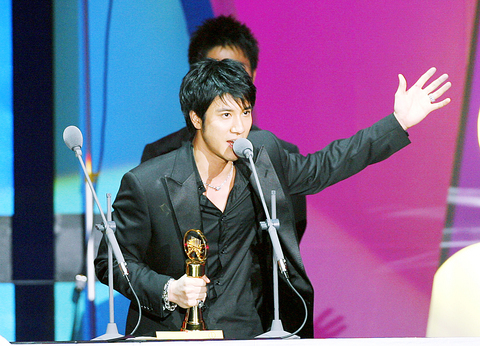There were high expectations for altnative music at last night's Golden Melody Awards, but with Wang Lee-hom (
In a drawn out ceremony last night, Taiwan's music industry gave out awards for its high achievers in the 17th Golden Melody Awards (十七屆金曲獎), which took place at Taipei Arena, Taipei (台北巨蛋). Thousands of fans crowded outside the stadium to get a sight of their favorite stars.
On the red carpet, Little S (小S) and Momoko Tao (陶子), the hosts for the night, enlivened proceedings by spraying "milk" from their breasts into the crowd. This little performance follows months of media reports about the birth of their baby girls and whether they would be back in shape for this glamorous event. Little S looked fine, but Tao clearly still has some way to go before achieving her previous slim shape.

This rather gross display was followed in the award ceremony by some poorly rehearsed performances by Stefanie Sun and Hong Kong pop star Eason Chan (
Taike promoters Chang Chen-yue (
Some familiar faces were missing from the nomination list, and last night's event featured an unusually large number of stars drawn from Taiwan's alt-music scene. While folk and folk-rock have always had a presence at the Golden Melody Awards, their prominence this year has been underlined by the inclusion of Puyuma folksinger and activist Kimbo, also known as Hu De-fu (

PHOTOS: TAIPEI TIMES
This year, awards were presented in 31 categories, with nominees selected by a 33-member panel of judges from a staggering 6,884 entries.
Kimbo had picked up the award for Best Lyricist and Best Song, which many people thought was long-overdue recognition of his contribution to music in Taiwan.
Kimbo's first album In a Flash, a retrospective record looking back at the legendary Aboriginal crooner's 30-year musical career from 1972 to 2001, was a talking point in the run up to the event. He is best known for his vocal prowess and his poetic folk music full of social

commentaries. Kimbo has also been an activist in Taiwan's social, political and Aboriginal movements and was blacklisted by the Chinese Nationalist Party (KMT) government in the late 1970s and early 1980s for his outspoken dissident voice.
Another veteran of the music scene Lin Jia-qing (
As many expected, Wu Bai (
Penny Tai (戴佩妮) took one of the first pop musical awards for best composer for Crazy Love. Speaking backstage after receiving the honor, Tai said she was shocked by the totally unexpected recognition. "I am a self-taught composer who has little talent in song-writing, and I never thought that my songs would get spread outside my room. Crazy Love is a very personal song, and at first I didn't even want to have it released," the misty-eyed songstress said in a humble tone.
The highlight of last night's event came when award presenters Wu Bai and Gigi Leung (
The Best Band category saw the emergence of underground and alternative acts such as the Hohak Band (
With little surprise, the better known Chairman (董事長) took the award for best band, squeezing out other nominees Nature Q, Sodagreen, Won Fu, LTK Commune and Hohak Band, which was awarded the Best Hakka Album award for Hohak Carnival.
The absence of heavyweight teen idols such as the Double J pair Jay Chou (周杰倫) and Jolin Tsai (蔡依林) and the dominant presence of Kimbo had generated considerable speculation about a shift in the Golden Melody Awards from big-ticket pop acts to smaller and more intimate singer/song writers. But in fact Penny Tai, Cheer Chen and songstress Tanya Tsai (蔡健雅), who were all nominated for Best Mandarin Female Singer this year are no strangers to the Golden Melodies, and Jolin Tsai has never been a jury favorite. A bias toward the alternative scene announced itself back in 2000 with Faith Yang (楊乃文) beating out Faye Wang (王菲) and A-mei (張惠妹) to walk away with Best Mandarin Female Singer title.
More recently, last year's award ceremony saw the alt-music songstress Sandy Chen (陳珊妮) take top honors in Best Album and Best Producer categories whereas the favorite Golden Melody winner Jay Chou walked away empty handed despite nominations in six categories.
Hakka and Aboriginal sounds have also risen to prominence at the Golden Melody in recent years. Last year Hakka band Sheng Xiang and Water 3 (生祥與瓦窯3) had seven nominations, winning Best Lyricist, Best Hakka Album and Best Band. Beinan musician Chen Chian-nien (陳建年) also took the best male singer title away from other high-profile contenders such as Wang Lee-hom (王力宏) and Jackie Cheung (張學友).

April 14 to April 20 In March 1947, Sising Katadrepan urged the government to drop the “high mountain people” (高山族) designation for Indigenous Taiwanese and refer to them as “Taiwan people” (台灣族). He considered the term derogatory, arguing that it made them sound like animals. The Taiwan Provincial Government agreed to stop using the term, stating that Indigenous Taiwanese suffered all sorts of discrimination and oppression under the Japanese and were forced to live in the mountains as outsiders to society. Now, under the new regime, they would be seen as equals, thus they should be henceforth

Last week, the the National Immigration Agency (NIA) told the legislature that more than 10,000 naturalized Taiwanese citizens from the People’s Republic of China (PRC) risked having their citizenship revoked if they failed to provide proof that they had renounced their Chinese household registration within the next three months. Renunciation is required under the Act Governing Relations Between the People of the Taiwan Area and the Mainland Area (臺灣地區與大陸地區人民關係條例), as amended in 2004, though it was only a legal requirement after 2000. Prior to that, it had been only an administrative requirement since the Nationality Act (國籍法) was established in

With over 100 works on display, this is Louise Bourgeois’ first solo show in Taiwan. Visitors are invited to traverse her world of love and hate, vengeance and acceptance, trauma and reconciliation. Dominating the entrance, the nine-foot-tall Crouching Spider (2003) greets visitors. The creature looms behind the glass facade, symbolic protector and gatekeeper to the intimate journey ahead. Bourgeois, best known for her giant spider sculptures, is one of the most influential artist of the twentieth century. Blending vulnerability and defiance through themes of sexuality, trauma and identity, her work reshaped the landscape of contemporary art with fearless honesty. “People are influenced by

The remains of this Japanese-era trail designed to protect the camphor industry make for a scenic day-hike, a fascinating overnight hike or a challenging multi-day adventure Maolin District (茂林) in Kaohsiung is well known for beautiful roadside scenery, waterfalls, the annual butterfly migration and indigenous culture. A lesser known but worthwhile destination here lies along the very top of the valley: the Liugui Security Path (六龜警備道). This relic of the Japanese era once isolated the Maolin valley from the outside world but now serves to draw tourists in. The path originally ran for about 50km, but not all of this trail is still easily walkable. The nicest section for a simple day hike is the heavily trafficked southern section above Maolin and Wanshan (萬山) villages. Remains of